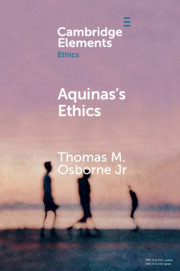Element contents
Aquinas's Ethics
Published online by Cambridge University Press: 17 April 2020
Summary
- Type
- Element
- Information
- Series: Elements in EthicsOnline ISBN: 9781108581325Publisher: Cambridge University PressPrint publication: 07 May 2020
References
Primary Sources
Secondary Sources
- 6
- Cited by



